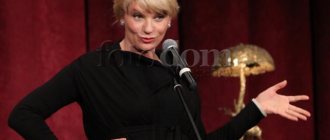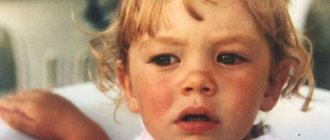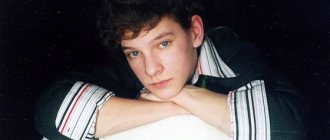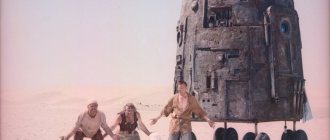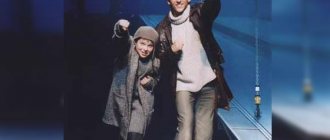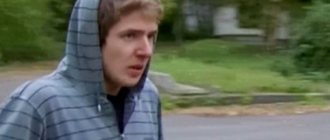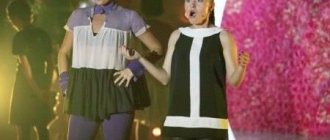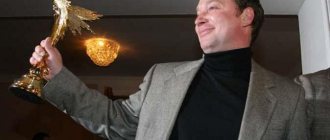Biography
Anton Igorevich Komolov is a Russian television and radio presenter, DJ, producer, writer, and member of the World Wildlife Fund.
Anton Komolov is a native Muscovite, born on April 4, 1976 into an intelligent metropolitan family. Anton's mother is a philologist, his father is an engineer. From childhood, my mother instilled in her son a love of language and literature. At the age of three, Anton was already reading fluently, and by the age of six he had mastered “Anna Karenina” and Chekhov’s stories.
The boy loved to read, but was lazy to write. Perhaps because he is left-handed, and in Soviet times teachers forced children to write with their right hand. Anton has a sister, Katya Ermolova, born in 1983, who received the profession of producer and has already released three films - “The Lost Place”, “First Love”, “The Apprentice”.
Anton Komolov studied at a lyceum with a physics and mathematics focus and knew that he would enter the Moscow State Technical University named after N. E. Bauman. I entered and successfully graduated from the university. During his student years, Anton was invited to the university KVN team, which in 1997 became the champion of the Moscow League.
Anton Igorevich Komolov on social networks:
Vkontakte: vk.com/antonkomolov Facebook: facebook.com/anton.kom… Twitter: twitter.com/antonkomolov Instagram: instagram.com/antonkom… Official website: antonkomolov.ru
One of the most famous and titled radio hosts in our country, Anton Komolov, was born in the capital. His parents are well-rounded personalities, because his mother is a philologist, and his father is an engineer.
Parents always paid a lot of attention to Anton, which is why, at the age of three, this boy could read fluently and spoke well.
It should be noted that his mother desperately instilled in the child a love of literature, so even before going to first grade, the boy read such serious works as, for example, the novel “Anna Karenina”. It should be noted that, like many creative personalities, Anton is left-handed. True, at school it was more of a problem for him.
Despite the obvious craving for philology, in the 10th grade Anton moved to physics and mathematics school No. 1180, and after that in 1994 he entered the Moscow State Technical University named after N. E. Bauman.
Here the world of KVN opened up for the young man , into which he selflessly plunged headlong. His team even became the champion of the Moscow Club League, and a little later Anton even sat as a jury member at Major League games.
Another fate was that in his second year at university, Komolov came across an advertisement from Radio Maximum about recruiting DJs, sent in his resume and then came to work there. True, he didn’t become a DJ then; Anton was hired as a telephone operator and freelance correspondent.
Anton explained his eagerness to start working quite predictably - he wanted financial independence . Komolov had just turned 18 years old and his first romantic relationship appeared, which required not only walks under the moonlight, but also trips to cafes and cinemas.
That is why, a year later, he left “Maximum” and began working on “Silver Rain”, where he was entrusted with broadcasting. It was this time, 1995, that can be considered the time of the appearance of a new star - radio host Anton Komolov.
The young man turned out to be so organic and bright on the air that two years later he was invited to host a full-fledged morning program on the wave of Radio Classics.
After Anton became famous as a radio presenter, he was invited to television. This happened in 1997 and Komolov’s debut took place on the BIZ-TV channel, which at that moment belonged to Ivan Demidov.
A year later, Anton Komolov was invited to MTV Russia and it was after this that his face became truly famous.
Anton Komolov’s collection includes joint television works with Yana Churikova and Tanya Gevorkyan, but the most famous was his duet with Olga Shelest. Television “has not let go” of Anton to this day; not a year goes by without a new project with his participation being released.
But still, Komolov’s main work and vocation is radio. This can be judged at least by the fact that from 2011 to the present, Anton Komolov has been working as the host of the evening shows RUS and Acoustics on Europe Plus, paired with Elena Abitaeva.
In Anton’s personal life, everything has been stable for a long time. Many years ago, at one of the resorts, he met a girl named Vladlena. A light romance unexpectedly grew into a long and stable relationship that led to marriage.
Among other things, the spouses also have a working relationship, because Vladlena works for Anton as a concert director and also writes scripts for him. In 2006, the couple had a son.
Radio
Komolov has been working since his second year at university. Anton was 18 years old when the young man got a job as a freelance correspondent for Radio Maximum. Komolov did not want to be financially dependent on his parents, and the tiny scholarship was not enough to treat the girl to a hot dog or go to a restaurant. The young man worked at Maximum for a year, and in 1995 he began broadcasting on the Silver Rain radio station. Two years later, Anton Komolov began hosting a morning program on Radio Classics.
Anton recalls that he got to the radio station by accident - he saw an advertisement for a set of DJs and sent his resume, and did this several times. The young man was called and invited to audition only the third time.
In the 2000s, there were contracts with radio stations “Europe Plus”, “Mayak”, “Hit-FM”, where Anton Komolov showed himself in the programs “Only That Way!” Show", "Full Version", "No smoking show".
In 2011, the radio station Europe Plus offered the radio star a new contract. Anton agreed to become a co-host of the daily program “RUSH-RadioActive Show”. Together with Komolov, Lena Abitaeva is still broadcasting.
Alena Komolova, who is credited with being related to Anton Komolov, works as a presenter at the Moscow FM radio station. But neither Alena nor Anton confirm this information.
A television
Anton Komolov's work on television began at BIZ-TV in 1997. A year later, the MTV channel opened in Russia, and the young man went to work there. Komolov became a co-host of the “Big Cinema” and “Playstation” programs. Viewers saw Anton in the program “Morning Plant”, which in 1999 changed its concept and became known as “Cheerful Morning”.
The program, hosted by Anton Komolov and Olga Shelest, was fundamentally new for Russian television, because the presenters were allowed to do everything: run around the studio, cry, joke, dress as they pleased. The naturalness and spontaneity of this creative duo charged the audience with positivity.
In 2001, Olga Shelest and Anton Komolov became producers of the “Gimlet Rule” program. Organizational issues were added to the constant broadcasts. In 2002, Anton went to the TVS channel, where he participated in the programs “Earth-Air” and “Big Repairs”.
Anton also remembers the “Short Circuit” project. The talk show audience is housewives. Komolov appeared on camera in turtlenecks and jackets with elbow pads that looked more like patches. At the age of 27, the concept of the program seemed unexpected to the TV presenter, and Anton left the project. At the same time, Komolov appeared in the music reality show of the Rossiya channel “People’s Artist”, where he became a member of the jury. Together with the TV and radio star, the judges of the project were Larisa Dolina, Tigran Keosayan, Laima Vaikule, Gennady Khazanov.
During 2004-2006, Anton Komolov represented the NTV channel, where the TV star hosted the programs “Morning on NTV” and “The Price of Good Luck.” After a short break, the duet of Komolov and Shelest appears on the Zvezda TV channel in the evening broadcast of the TV show “Starry Evening with Anton Komolov and Olga Shelest.”
In 2010, the creative tandem of Anton and Olga presented the show “MTV Generation. We love the 90s." At the same time, Komolov entered into a contract with the creators of the program “How It’s Made,” which was broadcast on the TV-3 channel, and a year later he began hosting the program “Mechanical Orange” on REN TV.
In 2012, Anton Komolov appeared on children's television: the Karusel channel aired the program “Olympians” with the participation of a TV presenter. From this same time, Anton Komolov’s collaboration with Ivan Urgant began, in whose humorous program Anton gets the “I live!” section. with Anton Komolov." In 2013, the popular presenter delighted viewers of the channels “STS”, “TNT” and “Friday”, where he appeared in the programs “Children know a lot”, “The country plays Kvass Lotto” and “Friday News”.
With the participation of the TV presenter, the reality show “Racers”, the program “Daddy Can It?”, and the program “Fresh Air” were also released.
Today Anton Komolov collaborates with several channels and radio stations, and from 2000 to 2003 he was a member of the jury of the KVN Major League, and in 2001 - of the KVN festival “Voting KiViN”.
Anton Komolov has repeatedly won television and radio awards for his creative biography. The young man first received the award in 1999 from the publication “Stylish Things” in the category “The Most Stylish Presenter.” In 2000, he received the “Best TV Presenter” award from the mass media “Quality Mark - 2000”.
In 2001 and 2020, Anton became a nominee for the TEFI Award. In 2009, Komolov and Shelest managed to become laureates of the Radiomania award. The TV presenter has already participated in this competition from 2005-2007. In 2011, Komolov received a prize from the open competition of journalists “Moscow Media”.
Star Trek
From December 1994 to July 1995, he worked at Radio Maximum as a freelance correspondent. In August 1995, he made his debut on the Silver Rain radio station as a presenter of information programs. In March 1997, he left for Radio Classics, where he was one of the hosts of the morning show Pirate Radio. Then there were broadcasts on Hit-FM, where Anton worked as a DJ until April 2001. Anton first appeared on television in 1997 on the first Russian music channel BIZ-TV. Since the opening of MTV-Russia in September 1998, he has become the host of the “Big Cinema” programs paired with Yana Churikova and Playstation with Tanya Gevorkyan. In the early morning of July 5, 1999, the “Morning Factory” program, which consisted entirely of a selection of music videos, was replaced by a fundamentally new interactive show - a morning explosion, charging viewers with vigor and fun for the whole day. The program “Bright Morning” features the famous and inimitable duet of Anton and Shelest. For the first time, live presenters are allowed literally everything - they behave completely naturally: they rush around the studio, joke around, quarrel, make peace, cry on each other’s shoulders, change into any costume - from striped pajamas to costumes of heroes of folk tales. In the summer of 2001, Anton Komolov, joining forces with Shelest, became with her the producer of the new program “Gimlet Rule”. Now, in addition to working on camera, the new producers are faced with numerous administrative and organizational problems.
Now Anton works as a DJ at the Mayak radio station and as the host of the TV-3 program “How It’s Made.” And in the fall of 2010, Shelest and Komolov made their triumphant return to MTV with the program “Generation MTV. We love the 90s."
By the way, Anton Komolov’s height is 178 cm.
Personal life
The presenter was more than once credited with having an affair with Olga Shelest - too often the presenters appear together on camera. According to Anton, they are connected by work and long-term friendship.
Komolov is happily married to his wife Vladlena. Komolov’s personal life was changed by the holiday romance that occurred between Anton and Vladlena in 1997. The relationship, which originated on the Mediterranean coast of Spain, did not end after the vacation, but grew into a long-term strong union.
Anton Komolov says that Vladlena attracted him with her beautiful appearance and rich soul, subtle mind and femininity. For several years, the young people lived in a civil marriage, after which they decided to legalize the relationship in order to avoid bureaucratic difficulties with registering children.
In 2006, Anton Komolov became a father. The TV presenter turned out to be a responsible head of the family, a caring husband and a loving father. The TV presenter spent a lot of time with his newborn son Andrei - his work schedule allowed. And today Anton spends his free time with his family, because his son and wife are the radio host’s main priority.
Vladlena works as her husband’s concert director, writes scripts, and deals with organizational issues when Anton Komolov is invited to hold major events.
Anton Komolov is an active participant in social networks. The TV presenter has personal pages on Twitter, Facebook, Instagram, Vkontakte, where Anton posts interesting photos and videos. On behalf of Anton Komolov there is an official website dedicated to projects in which the TV presenter participates.
An excerpt characterizing Komolov, Anton Igorevich
The forces of twelve languages of Europe rushed into Russia. The Russian army and population retreat, avoiding a collision, to Smolensk and from Smolensk to Borodino. The French army, with ever-increasing speed, rushes towards Moscow, towards the goal of its movement. The strength of its swiftness, approaching the target, increases, just as the speed of a falling body increases as it approaches the ground. A thousand miles away is a hungry, hostile country; There are dozens of miles ahead, separating us from the goal. Every soldier of the Napoleonic army feels this, and the invasion is approaching by itself, by sheer force of swiftness. In the Russian army, as they retreat, the spirit of bitterness against the enemy flares up more and more: retreating back, it concentrates and grows. There is a clash near Borodino. Neither one nor the other army disintegrates, but the Russian army immediately after the collision retreats just as necessarily as a ball necessarily rolls back when it collides with another ball rushing towards it with greater speed; and just as inevitably (although having lost all its strength in the collision) the rapidly scattering ball of invasion rolls over some more space. The Russians retreat one hundred and twenty versts - beyond Moscow, the French reach Moscow and stop there. For five weeks after this there is not a single battle. The French don't move. Like a mortally wounded animal, which, bleeding, licks its wounds, they remain in Moscow for five weeks, doing nothing, and suddenly, without any new reason, they run back: they rush to the Kaluga road (and after the victory, since again the battlefield remained behind them near Maloyaroslavets), without engaging in a single serious battle, they ran even faster back to Smolensk, beyond Smolensk, beyond Vilna, beyond the Berezina and beyond. On the evening of August 26, both Kutuzov and the entire Russian army were confident that the Battle of Borodino had been won. Kutuzov wrote to the sovereign in this way. Kutuzov ordered preparations for a new battle in order to finish off the enemy, not because he wanted to deceive anyone, but because he knew that the enemy was defeated, just as each of the participants in the battle knew it. But that same evening and the next day, news began to arrive, one after another, about unheard-of losses, about the loss of half the army, and a new battle turned out to be physically impossible. It was impossible to give battle when information had not yet been collected, the wounded had not been removed, shells had not been replenished, the dead had not been counted, new commanders had not been appointed to replace the dead, people had not eaten or slept. And at the same time, immediately after the battle, the next morning, the French army (due to that rapid force of movement, now increased as if in the inverse ratio of the squares of the distances) was already advancing by itself on the Russian army. Kutuzov wanted to attack the next day, and the whole army wanted this. But in order to attack, the desire to do so is not enough; there needs to be an opportunity to do this, but this opportunity was not there. It was impossible not to retreat to one transition, then in the same way it was impossible not to retreat to another and a third transition, and finally on September 1, when the army approached Moscow, despite all the strength of the rising feeling in the ranks of the troops, the force of things demanded so that these troops march for Moscow. And the troops retreated one more, to the last crossing and gave Moscow to the enemy. For those people who are accustomed to thinking that plans for wars and battles are drawn up by commanders in the same way as each of us, sitting in his office over a map, makes considerations about how and how he would manage such and such a battle, questions arise as to why Kutuzov didn’t do this and that when retreating, why he didn’t take up a position before Fili, why he didn’t immediately retreat to the Kaluga road, left Moscow, etc. People who are used to thinking like this forget or don’t know those inevitable conditions in which the activities of every commander in chief always take place. The activity of a commander does not have the slightest resemblance to the activity that we imagine, sitting freely in an office, analyzing some campaign on the map with a known number of troops, on both sides, and in a certain area, and starting our considerations with what some famous moment. The commander-in-chief is never in those conditions of the beginning of some event in which we always consider the event. The commander-in-chief is always in the middle of a moving series of events, and so that never, at any moment, is he able to think through the full significance of the event taking place. An event is imperceptibly, moment by moment, cut into its meaning, and at every moment of this sequential, continuous cutting of the event, the commander-in-chief is in the center of a complex game, intrigue, worries, dependence, power, projects, advice, threats, deceptions, is constantly in the need to respond to the countless number of questions proposed to him, always contradicting one another. Military scientists tell us very seriously that Kutuzov, much earlier than Filey, should have moved troops to the Kaluga road, that someone even proposed such a project. But the commander-in-chief, especially in difficult times, faces not one project, but always dozens at the same time. And each of these projects, based on strategy and tactics, contradicts one another. The commander-in-chief's job, it would seem, is only to choose one of these projects. But he cannot do this either. Events and time do not wait. He is offered, let’s say, on the 28th to go to the Kaluga road, but at this time Miloradovich’s adjutant jumps up and asks whether to start business with the French now or retreat. He needs to give orders now, this very minute. And the order to retreat takes us off the turn onto the Kaluga road. And following the adjutant, the quartermaster asks where to take the provisions, and the head of the hospitals asks where to take the wounded; and a courier from St. Petersburg brings a letter from the sovereign, which does not allow the possibility of leaving Moscow, and the rival of the commander-in-chief, the one who undermines him (there are always such, and not one, but several), proposes a new project, diametrically opposed to the plan for access to the Kaluga road; and the forces of the commander-in-chief himself require sleep and reinforcement; and the venerable general, bypassed by a reward, comes to complain, and the inhabitants beg for protection; the officer sent to inspect the area arrives and reports the exact opposite of what the officer sent before him said; and the spy, the prisoner and the general doing reconnaissance - all describe the position of the enemy army differently. People who are accustomed to not understanding or forgetting these necessary conditions for the activity of any commander-in-chief present to us, for example, the situation of the troops in Fili and at the same time assume that the commander-in-chief could, on September 1st, completely freely resolve the issue of abandoning or defending Moscow, whereas in the situation of the Russian army five miles from Moscow this question could not have arisen. When was this issue resolved? And near Drissa, and near Smolensk, and most noticeably on the 24th near Shevardin, and on the 26th near Borodin, and on every day, hour, and minute of the retreat from Borodino to Fili. Russian troops, having retreated from Borodino, stood at Fili. Ermolov, who had gone to inspect the position, drove up to the field marshal. “There is no way to fight in this position,” he said. Kutuzov looked at him in surprise and forced him to repeat the words he had said. When he spoke, Kutuzov extended his hand to him.
Anton Komolov now
In 2020, Anton Komolov became the author of the book. The TV presenter released the publication “I am a Sloth,” which was included in the “Entertaining Zoology” series. In 2020, the channel “Yu” aired the program “Diet for a Budget”, the TV presenter of which was Anton Komolov. The theme of the program is budget savings in modern conditions.
Now the TV presenter is also involved in charity work. Anton is on the board of the World Wildlife Fund (WWF) and the board of trustees of the Center for Curative Pedagogy to help children with developmental disabilities.

